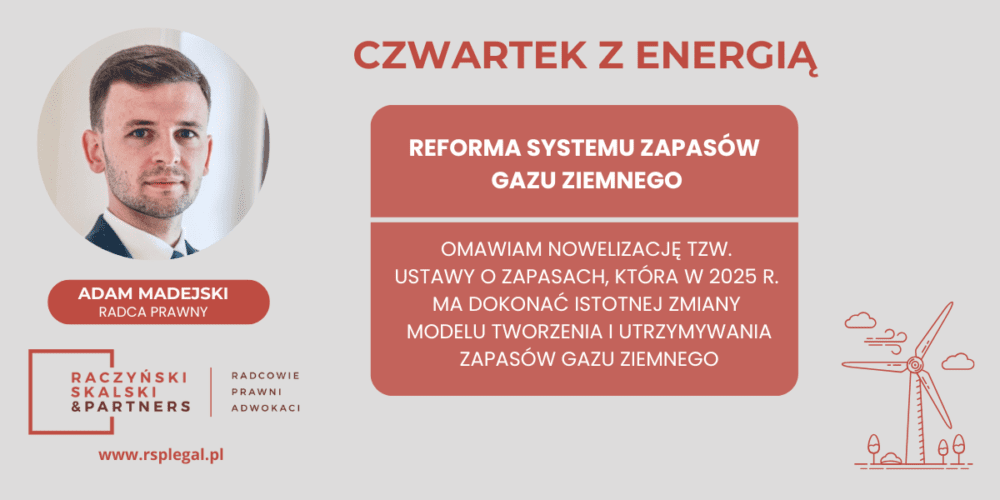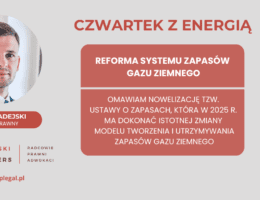Legislative work is underway to amend the Law on Stockpiles of Crude Oil, Petroleum Products and Natural Gas and the Principles of Handling Situations of Threat to State Fuel Security and Oil Market Disturbances (the “Stockpile Law”). The need for the changes is backed by the European Commission’s position of January 23, 2020. (C 2020 396), according to which the current regulations governing the system of mandatory stocks of natural gas in terms of the requirements imposed on importers and traders storing natural gas outside Poland are inconsistent with the provisions of Regulation (EU) 2017/1938 of the European Parliament and of the Council of October 25, 2017 concerning measures to safeguard security of natural gas supply and repealing Regulation (EU) No 994/2010.
Work on the amendment has been going on for a long time, and the draft is currently undergoing an opinion procedure (https://legislacja.gov.pl/projekt/12392210/katalog/13098784#13098784). It is certain that the natural gas stockholding system is facing significant reform.
1. Government Strategic Reserve Agency in a new role
The existing model of maintaining so-called mandatory reserves of natural gas rests with market participants – importers and entrepreneurs trading in natural gas with foreign countries (Article 24(1) of the Law on Reserves). These stocks can be triggered in the event of an event specified in the law that poses a risk of supply disruption or shortage of natural gas.
Under the amendment, the obligation to establish strategic natural gas stocks will pass to the Government Strategic Reserve Agency (“RARS”, “Agency”). Thus, Articles 24a and 24b, as well as part of Article 24 of the Inventory Law, which detail the obligations of entities previously required to establish natural gas stocks, will disappear.
The creation of stocks by RARS is to be possible through several sources: commodity exchanges and regulated markets of EEA member countries, as well as through tenders, auctions and public procurement (proposed Article 25a of the Stocks Act).
The agency will be able to store gas in domestic and foreign facilities, provided that the entire stockpile can be delivered to the transmission system within 50 days. RARS will also have the ability to trade in natural gas for replenishment or reduction of stocks (proposed Article 25b of the Stocks Law). Basing the model for replenishment and reduction of strategic stocks on regulated markets and commodity exchanges will make natural gas procurement prices more realistic. Strategic stocks will be owned by the State Treasury (proposed Article 25d paragraph 1 of the Law on Stocks), and the disposer of the stocks will be the minister in charge of energy resources management (proposed Article 26 paragraph 1 of the Law on Stocks).
The funds necessary for the creation and maintenance of strategic stocks will be obtained by the Agency from the so-called gas fee, paid by obligated enterprises, which include:
-
- operators of the gas system,
- operators of the natural gas liquefaction system,
- storage system operators.
- the customer of the natural gas transportation service for which natural gas is transported from the high-methane gas transmission system to the gas distribution system, or who receives natural gas at the exit point from the high-methane gas transmission system to the final customer (definition in the proposed Article 2.32 of the Law on Stocks).
The rate of the gas fee is to be determined by the minister in charge of energy resources management, taking into account the planned costs to be incurred by the Agency to fulfill its obligation to maintain strategic stocks (proposed Article 25d(4) of the Stocks Law). The fee will be paid in monthly cycles.
By May 31, 2025. RARS will be required to notify entities that currently maintain natural gas stocks of its intention to acquire those stocks, and thus count them as strategic stocks already under the aegis of the new system created by the amendment. Contracting for the transfer of stocks is to last until September 30, 2025.
2. Other changes
In other respects, the following changes proposed in the amendment are noteworthy:
-
- new definitions of protected recipients:
- Definition of protected recipient and protected recipient under joint and several support.
- The catalog of protected recipients under both definitions includes, among others, households, micro, small and medium-sized enterprises, entities providing basic social services (e.g., educational, medical institutions) and heat suppliers to these groups.
2. Changes to emergency procedures:
- The amount of strategic reserves specified by the law (12.301 TWh), will be able to be increased by decision of the minister in charge of energy resources management.
- Gas system operators will be given the opportunity to launch strategic stocks with the prior approval of the minister in charge of energy resources management, unless the use of the stocks is necessary to ensure the integrity of the gas system. In that case, the minister’s approval is not required, but the stocks can be used by the operator up to 5% of the level of accumulated stocks and must be replenished within 7 days.
3. Summary
The reform centralizes responsibility for strategic natural gas stocks, which can increase management efficiency and national energy security. The introduction of the gas fee greatly simplifies the existing system, which imposes a number of administrative and operational obligations on gas market participants. What remains to be reckoned with is the smooth implementation of the regulations to enable obligated entities to prepare to pay the first gas fee.



